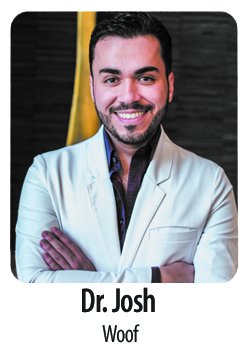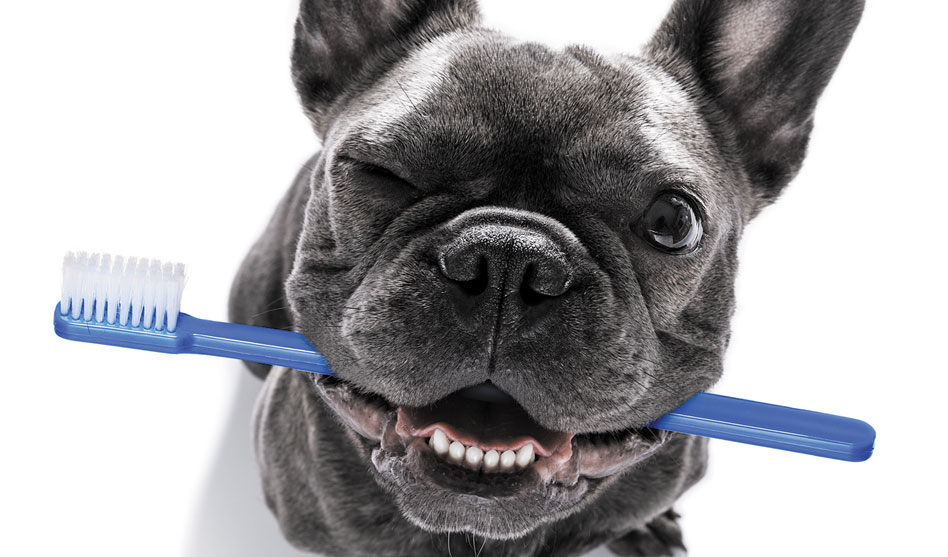Tips on dental hygiene for pets for Pet Dental Health month
 We are one month into 2023, and we are back with our Woof column for February. I hope this year is treating you well so far, and thank you for supporting this amazing magazine and my monthly column, as always.
We are one month into 2023, and we are back with our Woof column for February. I hope this year is treating you well so far, and thank you for supporting this amazing magazine and my monthly column, as always.
Welcome back!
I am excited for this month’s topic because it is such a vital issue that we see with almost all of our pets, and it is an issue we can easily address. Every February, we celebrate National Pet Dental Health Month in the U.S., allowing us to raise awareness about dental disease in dogs and cats and the importance of prevention and treatment. Dental disease (you may also hear it called periodontal disease) is one of the most common diseases seen in dogs and cats. It includes gingivitis (inflammation of the gums), bad breath, plaque, tartar, oral cavity abscesses, pain, wiggly teeth and bone loss around the teeth.
I would like to point out that once we see that there is tartar accumulated on our babies’ teeth, only a proper dental cleaning can actually remove it. These dental cleanings are usually performed once yearly while under anesthesia, although some cats and dogs have “better” teeth than others and may not be in desperate need of yearly dental cleanings.
That being said, even if their teeth and mouth look normal, they can still have issues that may only be found through a thorough dental cleaning and dental radiographs (if available), which is why most veterinarians recommend these procedures be performed once a year.
When discussing these issues with your veterinarian, the vet will examine your baby’s teeth, and, as a team, you can determine what the next steps should be.
It is important to know that not every fur baby is considered a good candidate to undergo anesthesia, which means your doctor will discuss with you whether you should consider a dental cleaning or not. Typically, if pre-anesthetic blood work and physical exam are fairly normal, we consider the anesthetic-related risks to be low.
While treating and addressing dental disease are important, prevention is important as well. The gold standard for prevention of dental disease is brushing our pet’s teeth daily, even though that is surely easier said than done. I recommend consulting your veterinarian about how to make this job easier for both your pets and you. If for any reason you are not able to brush your pet’s teeth, you can still offer the toothpaste as a treat daily, as it has enzymes that break down some of the plaque. The tartar, though, will still remain and can only be properly removed with an actual dental cleaning (which is not the same as brushing the teeth).
In addition to brushing their teeth, you may also want to consider adding dental treats to your pets’ dental care routine. There are other products out there that may be added as well, but, in deciding which products are best, I recommend visiting the Veterinary Oral Health Council’s website (VOHC.org), where you will find a thorough list of approved dental products for both dogs and cats.
Always consider introducing any dental care routine slowly, and be sure to associate it with a positive experience, since we want to be proactive and perform these tasks daily.
It all starts with your veterinarian performing a dental exam on your baby, and then, based on that assessment, they can recommend a more specific dental care routine. If you currently do not have a veterinarian, feel free to contact my office in Addison, and I will perform a thorough exam and take my time to make sure all of your questions are addressed.
February’s National Pet Dental Health Month should be a reminder of the importance of being proactive about our loved ones’ dental health and should remind us that we all have tools to assist with that!
I hope this information has been helpful, and thank you for allowing me to share some thoughts on the well-being of our loved babies. As always, abrazos for you, and I look forward to sharing more knowledge next month. See you then!
Dr. Josh owns Isla Veterinary Boutique Hospital, 14380 Marsh Lane, Ste. 110 in Addison (next to Tom Thumb). Call him at 972-738-1111 or visit IslaVet.com.












